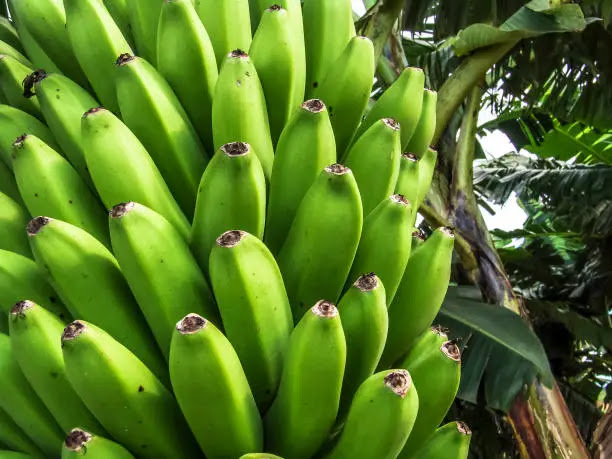Why
unripe bananas are a better choice than ripe ones.
Bananas
are one of the tastiest and easiest fruits to eat. In addition, they are
rich in many essential vitamins and minerals.
And while most
people prefer bananas that are yellow and ripe, green, unripe bananas are also
safe to eat. In fact, they offer a number of benefits to our body. That's
because they're a good source of resistant starch, which can help improve
digestion and support healthy gut bacteria.
It is also a good
source of potassium, which helps regulate blood pressure and supports heart
health. Additionally, unripe bananas have a lower sugar content than ripe
ones, making them a good choice for those looking to manage their blood sugar
levels.
Unripe vs. Ripe
Bananas – What’s the Difference?
Bananas are usually picked
while still green. Which practically helps ensure they won't overripe before
you buy them. But apart from the obvious difference in their color, green and
yellow bananas are also different:
On the taste:
Unripe bananas are less sweet. In fact, they can be a little bitter in taste.
Texture: Unripe
bananas are harder than yellow ones. In addition, they are more difficult to
peel than ripe ones.
In the recipe: Unripe
bananas have a lower sugar content. As bananas ripen and turn yellow, starches
are converted to sugars.
As the banana ripens, its
carbohydrate composition also changes. Unripe bananas contain mainly starch,
which makes up 70-80% of their weight. Much of this starch is resistant starch,
which is not digested in the small intestine. For this reason, they are rich in
dietary (vegetable) fiber. However, bananas lose their starch as they ripen.
During ripening, starch is converted into simple sugars (sucrose, glucose and
fructose). So ripe bananas contain only 1% starch.
Green bananas are also a good
source of pectin. This type of dietary fiber is found in fruits and helps them
maintain their structural form. Pectin breaks down when a banana is overripe,
which causes the fruit to become softer. The resistant starch and pectin in
green bananas can provide a number of health benefits, including improved blood
sugar control and better digestive health.
They help you feel full and
reduce appetite
Green bananas are very
filling, mainly due to their high fiber content. Fiber-rich foods provide bulk
and can promote satiety or fullness.
Both resistant starch and
pectin – the types of fiber found in green bananas – have been linked to
increased feelings of fullness after meals. In turn, this can cause you to
consume fewer calories. Which for obvious reasons can help with weight loss if
that's your goal.
They can improve the health of
the digestive system
Nutrients in green bananas may
also have a prebiotic effect. Instead of breaking down in the gut, resistant
starch and pectin feed the friendly bacteria in it.
Bacteria ferment these two types of fiber, producing butyrate and other beneficial short-chain fatty acids. Short-chain fatty acids may help with various digestive complications. In addition, some scientific evidence suggests that they help protect against colon cancer.







